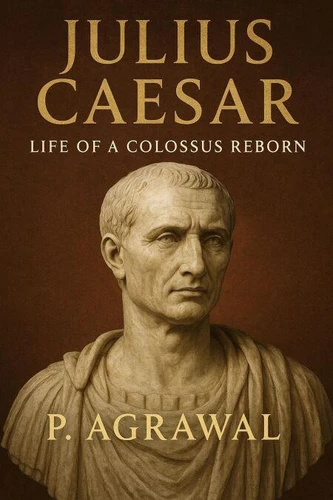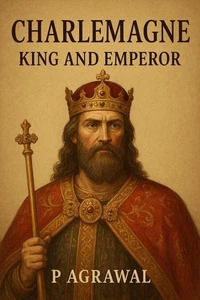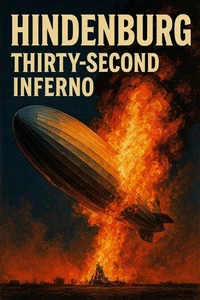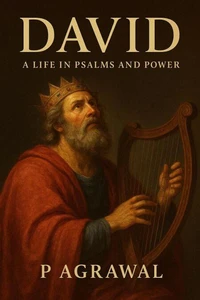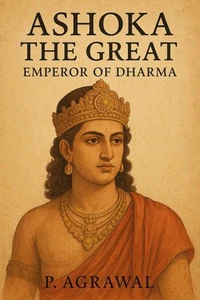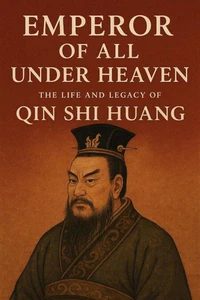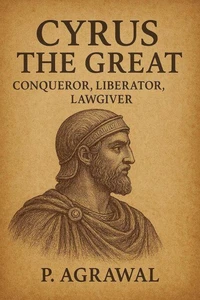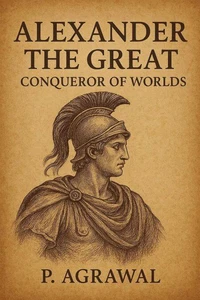Nouveauté
Julius Caesar: Life of a Colossus Reborn. Crowned in Glory: The World's Greatest Kings, #5
Par :Formats :
Disponible dans votre compte client Decitre ou Furet du Nord dès validation de votre commande. Le format ePub est :
- Compatible avec une lecture sur My Vivlio (smartphone, tablette, ordinateur)
- Compatible avec une lecture sur liseuses Vivlio
- Pour les liseuses autres que Vivlio, vous devez utiliser le logiciel Adobe Digital Edition. Non compatible avec la lecture sur les liseuses Kindle, Remarkable et Sony
 , qui est-ce ?
, qui est-ce ?Notre partenaire de plateforme de lecture numérique où vous retrouverez l'ensemble de vos ebooks gratuitement
Pour en savoir plus sur nos ebooks, consultez notre aide en ligne ici
- FormatePub
- ISBN8232903275
- EAN9798232903275
- Date de parution25/10/2025
- Protection num.pas de protection
- Infos supplémentairesepub
- ÉditeurDraft2Digital
Résumé
Julius Caesar: Life of a Colossus Reborn is a clear, richly told life of Rome's most consequential figure, following his journey from uncertain patrician youth to general, reformer, and enduring legend. Across twenty steady, narrative-driven chapters, the book opens in a restless Republic where faction and ambition shape a young Caesar's character, education, and ideals. It traces his first trials under Sulla, his narrow escape and formative exile, and his strategic return through law, oratory, and carefully built alliances that reveal a mind disciplined by purpose and patience.
The story then moves beyond the Alps, where Caesar's command in Gaul forges both empire and reputation. Campaigns against the Helvetii, Belgae, and Ariovistus, the engineering marvels at the Rhine, and the bold crossings to Britain portray a commander who wins by speed, logistics, and loyalty as much as by force. The political counterpart unfolds in Rome with the First Triumvirate, where Caesar, Pompey, and Crassus balance rivalry with necessity until pride, distance, and death crack their alliance.
The crossing of the Rubicon becomes the hinge of history-an act at once personal and civilizational-leading to the hard, sorrowful victory over Pompey and to Caesar's careful rebuilding of a broken Republic. At Rome's center, the book presents Caesar as a tireless reformer: reorganizing the Senate and provinces, curbing corruption, settling veterans, stabilizing grain and currency, and setting time itself in order through the Julian calendar.
His partnership with Cleopatra opens a window on the East-its learning, ceremony, and power-and frames his wider imperial vision. The chapters on honors, cult, and perception show how gratitude became reverence, and reverence bred fear, until friends turned against him. The Ides of March is told without melodrama: a public death amid statues and titles, followed by grief, fury, and the return of civil war.
The final movement examines memory and meaning. It follows the making of Divus Julius, the rise of his heir, and the way "Caesar" became a title shaping centuries of rule. It considers his writings, leadership, reforms, and the paradox of a statesman who sought order yet unsettled tradition. The concluding chapters reflect on modern lessons-vision with restraint, courage with empathy, clarity with humility-showing why his story remains alive wherever people think about power, responsibility, and the fate of nations.
Clear in language and steady in pace, this book restores the human shape of the Colossus and the living echo of his world.
The story then moves beyond the Alps, where Caesar's command in Gaul forges both empire and reputation. Campaigns against the Helvetii, Belgae, and Ariovistus, the engineering marvels at the Rhine, and the bold crossings to Britain portray a commander who wins by speed, logistics, and loyalty as much as by force. The political counterpart unfolds in Rome with the First Triumvirate, where Caesar, Pompey, and Crassus balance rivalry with necessity until pride, distance, and death crack their alliance.
The crossing of the Rubicon becomes the hinge of history-an act at once personal and civilizational-leading to the hard, sorrowful victory over Pompey and to Caesar's careful rebuilding of a broken Republic. At Rome's center, the book presents Caesar as a tireless reformer: reorganizing the Senate and provinces, curbing corruption, settling veterans, stabilizing grain and currency, and setting time itself in order through the Julian calendar.
His partnership with Cleopatra opens a window on the East-its learning, ceremony, and power-and frames his wider imperial vision. The chapters on honors, cult, and perception show how gratitude became reverence, and reverence bred fear, until friends turned against him. The Ides of March is told without melodrama: a public death amid statues and titles, followed by grief, fury, and the return of civil war.
The final movement examines memory and meaning. It follows the making of Divus Julius, the rise of his heir, and the way "Caesar" became a title shaping centuries of rule. It considers his writings, leadership, reforms, and the paradox of a statesman who sought order yet unsettled tradition. The concluding chapters reflect on modern lessons-vision with restraint, courage with empathy, clarity with humility-showing why his story remains alive wherever people think about power, responsibility, and the fate of nations.
Clear in language and steady in pace, this book restores the human shape of the Colossus and the living echo of his world.
Julius Caesar: Life of a Colossus Reborn is a clear, richly told life of Rome's most consequential figure, following his journey from uncertain patrician youth to general, reformer, and enduring legend. Across twenty steady, narrative-driven chapters, the book opens in a restless Republic where faction and ambition shape a young Caesar's character, education, and ideals. It traces his first trials under Sulla, his narrow escape and formative exile, and his strategic return through law, oratory, and carefully built alliances that reveal a mind disciplined by purpose and patience.
The story then moves beyond the Alps, where Caesar's command in Gaul forges both empire and reputation. Campaigns against the Helvetii, Belgae, and Ariovistus, the engineering marvels at the Rhine, and the bold crossings to Britain portray a commander who wins by speed, logistics, and loyalty as much as by force. The political counterpart unfolds in Rome with the First Triumvirate, where Caesar, Pompey, and Crassus balance rivalry with necessity until pride, distance, and death crack their alliance.
The crossing of the Rubicon becomes the hinge of history-an act at once personal and civilizational-leading to the hard, sorrowful victory over Pompey and to Caesar's careful rebuilding of a broken Republic. At Rome's center, the book presents Caesar as a tireless reformer: reorganizing the Senate and provinces, curbing corruption, settling veterans, stabilizing grain and currency, and setting time itself in order through the Julian calendar.
His partnership with Cleopatra opens a window on the East-its learning, ceremony, and power-and frames his wider imperial vision. The chapters on honors, cult, and perception show how gratitude became reverence, and reverence bred fear, until friends turned against him. The Ides of March is told without melodrama: a public death amid statues and titles, followed by grief, fury, and the return of civil war.
The final movement examines memory and meaning. It follows the making of Divus Julius, the rise of his heir, and the way "Caesar" became a title shaping centuries of rule. It considers his writings, leadership, reforms, and the paradox of a statesman who sought order yet unsettled tradition. The concluding chapters reflect on modern lessons-vision with restraint, courage with empathy, clarity with humility-showing why his story remains alive wherever people think about power, responsibility, and the fate of nations.
Clear in language and steady in pace, this book restores the human shape of the Colossus and the living echo of his world.
The story then moves beyond the Alps, where Caesar's command in Gaul forges both empire and reputation. Campaigns against the Helvetii, Belgae, and Ariovistus, the engineering marvels at the Rhine, and the bold crossings to Britain portray a commander who wins by speed, logistics, and loyalty as much as by force. The political counterpart unfolds in Rome with the First Triumvirate, where Caesar, Pompey, and Crassus balance rivalry with necessity until pride, distance, and death crack their alliance.
The crossing of the Rubicon becomes the hinge of history-an act at once personal and civilizational-leading to the hard, sorrowful victory over Pompey and to Caesar's careful rebuilding of a broken Republic. At Rome's center, the book presents Caesar as a tireless reformer: reorganizing the Senate and provinces, curbing corruption, settling veterans, stabilizing grain and currency, and setting time itself in order through the Julian calendar.
His partnership with Cleopatra opens a window on the East-its learning, ceremony, and power-and frames his wider imperial vision. The chapters on honors, cult, and perception show how gratitude became reverence, and reverence bred fear, until friends turned against him. The Ides of March is told without melodrama: a public death amid statues and titles, followed by grief, fury, and the return of civil war.
The final movement examines memory and meaning. It follows the making of Divus Julius, the rise of his heir, and the way "Caesar" became a title shaping centuries of rule. It considers his writings, leadership, reforms, and the paradox of a statesman who sought order yet unsettled tradition. The concluding chapters reflect on modern lessons-vision with restraint, courage with empathy, clarity with humility-showing why his story remains alive wherever people think about power, responsibility, and the fate of nations.
Clear in language and steady in pace, this book restores the human shape of the Colossus and the living echo of his world.

